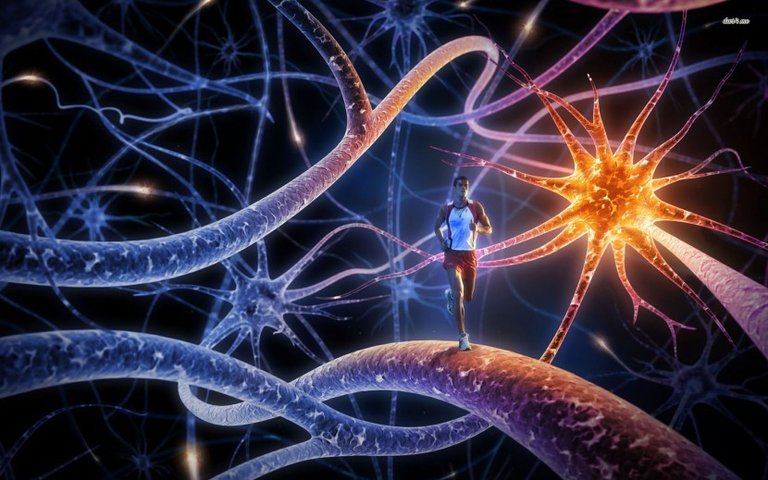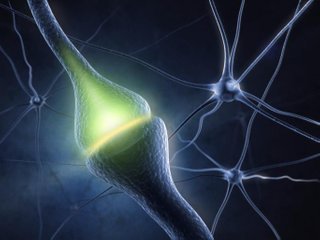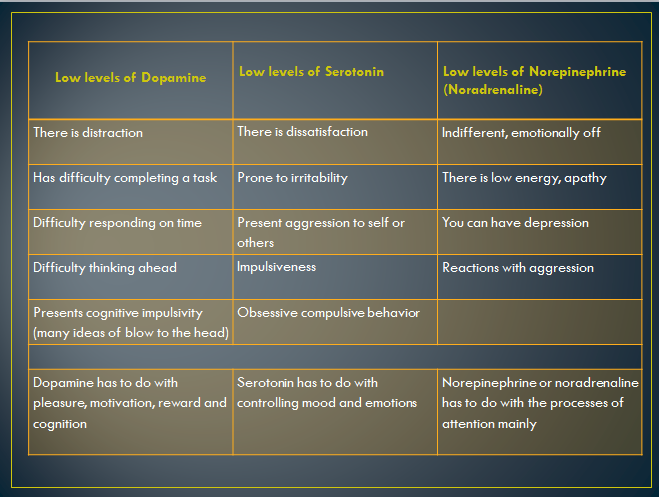
Source
How do you know, a child with Attention Deficit Hyperactivity Disorder has a special condition in the classroom:
"They learn quickly, get bored quickly and therefore lose interest quickly because of what is being explained to them" and therefore they become a headache for teachers who must attend a room full of children.

In order to better understand this idea, I have prepared a comparative table with exclusive material of Dr. Juan Carlos Pérez Castro Vázquez so that you can understand the behavior of a child with ADHD who does not have sufficient levels of these neurotransmitters:

Information obtained from the author Pérez and modified in Power Point by the author of the post
Knowing this, we can not downplay the fact that the child TDHA will be chemically of nature: deconcentrated, unmotivated, discouraged and dissatisfied if the necessary measures are not taken to keep them animated and motivated in the "learning process", for this reason I have wanted share with you some tips that have helped my children do not lose the north and can continue to be the good students they have always been (without it costing them).

Source
Winning the game to Dopamine:
As Dr. Pérez rightly says, dopamine plays a fundamental role in keeping the child motivated, emotion that is often truncated by the lack of structure and hyperactivity that characterize his behavior, for this reason, if you are a ADHD child's teacher . Take into consideration the following tips:
• Establishes a reward regime for completed activities.
• The rewards do not necessarily have to be related to the gift, a billboard divided by activities where you identify with happy, serious or sad faces will suffice.
• Take the time to write motivational messages in your book, such as: "you can do it", "keep going", "I have faith in you", "you can give more of yourself" will make the child feel valued.
Winning the game of Serotonin:
Serotonin is linked to emotions, so the teacher should consider that the child ADHD may be obfuscated, offended or irritated if compared to another child, then remember that:
• Avoid making comments that affect the child's self-esteem (hyperactivity is not something that you decide to have), for this it is better to look for activities that allow you to drain that excess energy.
• If the child is stuck in a task, help him to simplify the activity in order to remove him from his compulsive behavior.
• It gives rules of respect and coexistence to accept individuals.
Winning the Norepinephrine game:
The behavior of a child with a lack of Norepinephrine can be confused with an indifferent child, who does not feel empathy for their things, who does not feel responsible or who does not care about the results that can be obtained at the academic level, so it is good that:
• Invite the student to participation and integration.
• Do activities in groups that teach the child to interact and take responsibility for their participation fee.
• Keep in touch with your parents if you see that you tend to become depressed because you do not achieve the assigned activities, because you do not achieve the results you expected or because you simply do not know what is happening.
It should be noted that each of these recommendations can be applied to each of the students in the classroom, we are not talking about creating preferences or feeling sorry for a student with a condition, on the contrary, it is about applying tools that serve all students. group and make them feel like normal beings like others.

Bibliographic references:
- What happens in the brain when you suffer from ADHD. Dr. Juan Carlos Pérez Castro Vázquez. Available at: https://www.cerebrofeliz.org/articulostdah/cerebro_con_tdah.html
EH EH EH!!!!! Que emoción
Gracias!!!
Thank you!!!!
:)
Maravillosa publicación! Que herramientas tan importantes y bien explicativas para saber como es el complejo mundo de la bioquímica en el TDAH.Felicitaciones.
Graciiiaaaassss, que bueno que te gustó
:-)
Muy interesantes tus contenidos!!!
Gracias gracias @venezolanarte
:)